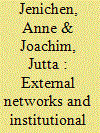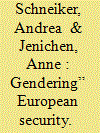|
|
|
Sort Order |
|
|
|
Items / Page
|
|
|
|
|
|
|
| Srl | Item |
| 1 |
ID:
155809


|
|
|
|
|
| Summary/Abstract |
In 2008, the Council of the European Union (EU) adopted a ‘Comprehensive Approach’ that outlines a strategy for securing gender mainstreaming; two years later, the Council introduced a set of indicators to assess its implementation. The EU was responding to the United Nations Security Council’s call for regional institutions to assist in implementing Security Council Resolution (UNSCR) 1325, adopted on 31 October 2000, concerning ‘women, peace and security’. This resolution sought to meet the ‘urgent need to mainstream a gender perspective into peacekeeping operations’. Considering that prior exposure to gender issues, resources and well-established relations with civil society and gender advocates are lacking, the adoption of both the Comprehensive Approach and the indicators, as well as the structures and procedures established since then as part of the EU’s Common Security and Defence Policy, requires some explanation. This article draws on feminist institutionalist approaches to argue that the impetus for change came from individuals and groups within the EU who were involved in external networks, both above and below the supranational level, who seized on institutional idiosyncrasies that also shaped the implementation of UNSCR 1325 in important ways.
|
|
|
|
|
|
|
|
|
|
|
|
|
|
|
|
| 2 |
ID:
158110


|
|
|
|
|
| Summary/Abstract |
The Organisation for Security and Co-operation in Europe (OSCE) has rarely been considered in scholarship on gender and security, even though it was one of the regional security organisations whose gender policy predated the United Nations Security Council’s call for more international attention to issues related to women, peace and security in October 2000. Based on an analysis of official OSCE documents and on semi-structured interviews, we trace the integration of gender issues in the OSCE and explore the rationale behind and the challenges associated with it. We identify two phases of gender policy change in the OSCE and show how the integration of UNSCR 1325 brought about an expansion of OSCE gender policy from an exclusive focus on “soft” security issues towards increased inclusion of gender in the area of “hard” security. Drawing on historical and feminist institutionalism, we argue that reform coalitions were crucial for the policy changes in the OSCE but that they encountered institutional and ideational barriers, which hampered implementation of the gender policy. In light of rising opposition, our analysis warns of a backlash that might jeopardise current achievements.
|
|
|
|
|
|
|
|
|
|
|
|
|
|
|
|
| 3 |
ID:
168589


|
|
|
|
|
| Summary/Abstract |
It is a common—often stereotypical—presumption that Europe is secular and America religious. Differences in international religious freedom and religious engagement policies on both sides of the Atlantic seem to confirm this “cliché.” This article argues that to understand why it has been easier for American supporters to institutionalize these policies than for advocates in the EU, it is important to consider the discursive structures of EU and US foreign policies, which enable and constrain political language and behavior. Based on the analysis of foreign policy documents, produced by the EU and the United States in their relationship with six religiously diverse African and Asian states, the article compares how both international actors represent religion in their foreign affairs. The analysis reveals similarities in the relatively low importance that they attribute to religion and major differences in how they represent the contribution of religion to creating and solving problems in other states. In sum, the foreign policies of both international actors are based on a secular discursive structure, but that of the United States is much more accommodative toward religion, including Islam, than that of the EU.
|
|
|
|
|
|
|
|
|
|
|
|
|
|
|
|
|
|
|
|
|